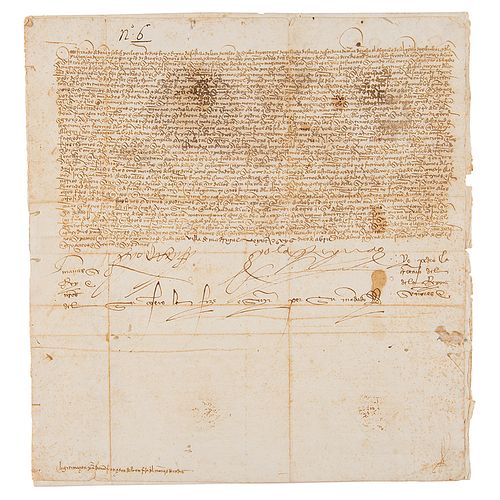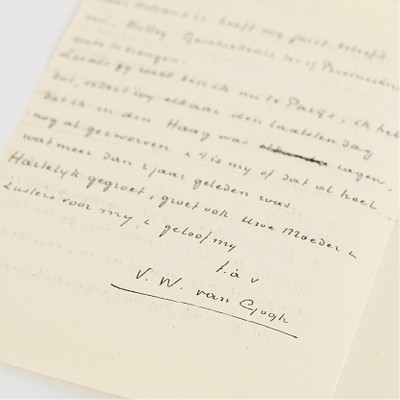Ferdinand and Isabella Document Signed
Two ways to bid:
- Leave a max absentee bid and the platform will bid on your behalf up to your maximum bid during the live auction.
- Bid live during the auction and your bids will be submitted real-time to the auctioneer.
Bid Increments
| Price | Bid Increment |
|---|---|
| $0 | $5 |
| $50 | $10 |
| $200 | $25 |
| $500 | $50 |
About Auction
Jun 15, 2022
RR Auction's June Fine Autograph and Artifact sale brings over 800 extraordinary items to the auction block, including: a four-page musical manuscript by Wolfgang Amadeus Mozart, containing four canons and an early autograph letter signed by the celebrated painter Vincent van Gogh. RR Auction support@rrauction.com
- Lot Description
Manuscript DS in Spanish, signed by Ferdinand, "Yo el Rey," and by Isabella, "Yo la Reyna,” one page, 12.25 x 13, April 6, 1476. Ferdinand and Isabella legitimize the cousin and sister-in-law of famed Spanish explorer and conquistador Juan Ponce de Leon, in a document issued to Rodrigo Ponce de Leon, regarding his daughter and heir Francisca de Leon. In full (translated): "Whereas you, Don Rodrigo Ponce de Leon, Marquis of Cadiz, Count of Arcos de la Frontera, our cousin and our Council, on your part have given us a statement that you, being, unmarried and not bound to orders or any other marriage, had a daughter, Dona Francisca de Leon, by Ines de Fuentes, she being a maiden, unwed and not bound to any marriage; and on your part we were entreated and petitioned for a grant legitimizing, qualifying, and rendering legitimate, able and capable the said Dona Francisca, your daughter for all and any things which legitimate men and women, born of lawful marriage, may and must be; and inasmuch as kings have power in temporal matters, just as the Holy Father has the power of legitimizing and granting dispensation in spiritual matters—
Wherefore to do a service and favor to you, the said Marquis, and to Dona Francisca, your daughter by this our letter, we legitimize her and render her legitimate, in order that she may and shall have all and any mayorazgos, vassals, landed property, person, real, and cattle, from you the said Marquis, and from the said Ines de Fuentes, her mother, and from any other of her relatives, ascendants, descendants, and of the collateral line, by any claims, gifts bestowed or bequeathed, and from formal wills, codicils, and nuncupative wills, or by adjudication of intestate estates, and in any other manner, just as if she were legitimate and born in lawful patrimony, and in order that she may enjoy all the honors, benefactions and grants, and immunities, liberties, exemptions and preeminences, and all the other things which those who are legitimate and born and bred in lawful marriage have and must have. And I lift and remove from the said Dona Francisca all infamy, prohibition, and blemish which by reason of her birth could be opposed to her both in and out of court. And I place her in such estate in order that she may and shall enjoy, and that she may and shall have, and there shall be accorded her all the said honors and grants aforesaid and those which persons who are legitimate and born in lawful marriage may and must enjoy and have.
And we make this grant and legitimation to the said your daughter of our own will and certain knowledge and royal absolute power. And we desire that it avail her, and be accorded her, now and henceforth in all time and obtain, notwithstanding the law of the decree which the King, our great grandfather—may God pardon him—issued and ordained in the courts of Briviesca, wherein it is contained that if any letter be granted contrary to law, fuero, or right, that such is to be obeyed and not carried out, although in such (case) other obligations are to be adjusted, whatever they may be; and notwithstanding the imperial law wherein it is contained that illegitimate children cannot succeed, nor be had or held in any acts, civil or public or lawful, if such is not done of the certain knowledge and wisdom of the sovereign. For especially of the said law as it concerns us and the said our certain knowledge and royal absolute power, we dispense with the said laws and with each one of them and with the derogatory clauses contained therein and with each or them, and with all the other laws, fueros and rights and customs which there are or may be against the aforesaid. And we desire and it is our grace that with regard to the said your daughter and said laws or any one of them be barred, notwithstanding they may prohibit this said grant and legitimation rendered by us.
And we therefore command dukes, counts, marquises, the religious, masters of orders, their commanders and sub-commanders, wardens of castles, houses, fortresses and plans, and our chief justices and judges, bailiffs, aldermen and chancellors, esquires, officials and good men of all cities, villas and parts of our kingdoms and dominions, which we now have or hold henceforth, and any or all of them to whom this our letter may be shown (or a copy thereof duly authenticated by a notary public and obtained by authority of a justice or judge) to defend and protect the said your daughter in this grant and legitimation which we render here.
And we render her this grant and legitimation without prejudice to the other sons and daughters and grandsons and granddaughters born in lawful marriage whom you may have now or in the future, or to other ascendants in direct line, should there be any; and in addition any rights which we should or could have made in any manner and for any reason to the property and inheritance contained in this our letter.
And it is our grace that this grant and legitimation which we make you is to be signed on the back by our chief chaplain or any other of our chaplains continuous conocidos, who hold a prebend from us, or by any others of our chaplains, continuos conocidos, of the said our chapel, who likewise hold a prebend from us, and that otherwise it is not valid in court or out of court. And no one of you or them shall act contrary to this in any way, under penalty or our favor and deprivation of office, and the confiscation to our exchequer of the property of those who do otherwise.
And furthermore we command whoever shall show the aforesaid our letter to summon them to appear before us in our court, wherever we may be, within the next fifteen days after they are summoned, under the said penalty. Under which penalty we command whatever notary is cited for this purpose to show them at the conclusion a duly attested court record thereof, authenticated by his sign, by which we may learn in what manner our command has been carried out. Given in the villa of Madrigal, the 26th day of April, in the year of the birth of our Lord Jesus Christ one thousand four hundred and seventy six."
Signed at the conclusion by Ferdinand and Isabella, and countersigned: "I, Pedro Samanas, secretary of the King and the Queen of their Council, caused it to be written at their command." Annotated at the bottom of the page: "Legitimation for Dona Francisca de Leon, daughter of the Marquis of Cadiz."
In very good to fine condition, with scattered light foxing, a few stains, and some tiny holes within the text; and red wax remnants where an embossed paper seal (present but detached), was affixed.
The 1469 marriage between Ferdinand and Isabella (at ages 17 and 18 respectively) strengthened their individual imperial power by uniting the Spanish kingdoms of Aragon and Castile. This assertion of royal authority inspired an insistence on religious uniformity that led to the Spanish Inquisition, a political weapon that enabled Ferdinand and Isabella to intimidate and eliminate their enemies. In addition to unifying Spain, Ferdinand and Isabella are, of course, best remembered as the patrons of Christopher Columbus whose voyages led to his discovery of the New World.
This unusual and early document pertains to the legitimacy of the daughter of a Castilian nobleman who was one of the military leaders in the War of Castilian Succession, an ongoing conflict at the time of our document that was decided in Isabella's favor. Later, Rodrigo de Leon was considered a major factor in Granada's [1491-1492] victory over the remaining Moors in the final years of the Reconquest. As a result, he was decorated by the Crown and given many titles and privileges, enhancing the Ponce de Leon family's overall royal prestige.
Rodrigo became Duke of Cadiz in 1484, and was briefly succeeded by his daughter, Francisca, the subject of our document, but Ferdinand and Isabella convinced her to permit the abolition of the Marquisate and Duchy of Cádiz after her death. The title was, however, recreated in 1820 and again in 1972.
Francisca was a second cousin of famed Spanish explorer and conquistador Juan Ponce De Leon and, after her marriage to his brother Luis, became his sister-in-law as well. Luis was the first marquis of Zahara and fifth lord of Villagarcia. Cadiz was an important port city from which Christopher Columbus launched his second (1493) and fourth (1502) voyages to the New World and, later, became home to the Spanish treasure fleet. - Shipping Info
-
Bidder is liable for shipping and handling and providing accurate information as to shipping or delivery locations and arranging for such. RR Auction is unable to combine purchases from other auctions or affiliates into one package for shipping purposes. Lots won will be shipped in a commercially reasonable time after payment in good funds for the merchandise and the shipping fees are received or credit extended, except when third-party shipment occurs. Bidder agrees that service and handling charges related to shipping items which are not pre-paid may be charged to a credit card on file with RR Auction. Successful international Bidders shall provide written shipping instructions, including specified Customs declarations, to RR Auction for any lots to be delivered outside of the United States. NOTE: Declaration value shall be the item’(s) hammer price and RR Auction shall use the correct harmonized code for the lot. Domestic Bidders on lots designated for third-party shipment must designate the common carrier, accept risk of loss, and prepay shipping costs.
-
- Buyer's Premium



 EUR
EUR CAD
CAD AUD
AUD GBP
GBP MXN
MXN HKD
HKD CNY
CNY MYR
MYR SEK
SEK SGD
SGD CHF
CHF THB
THB












